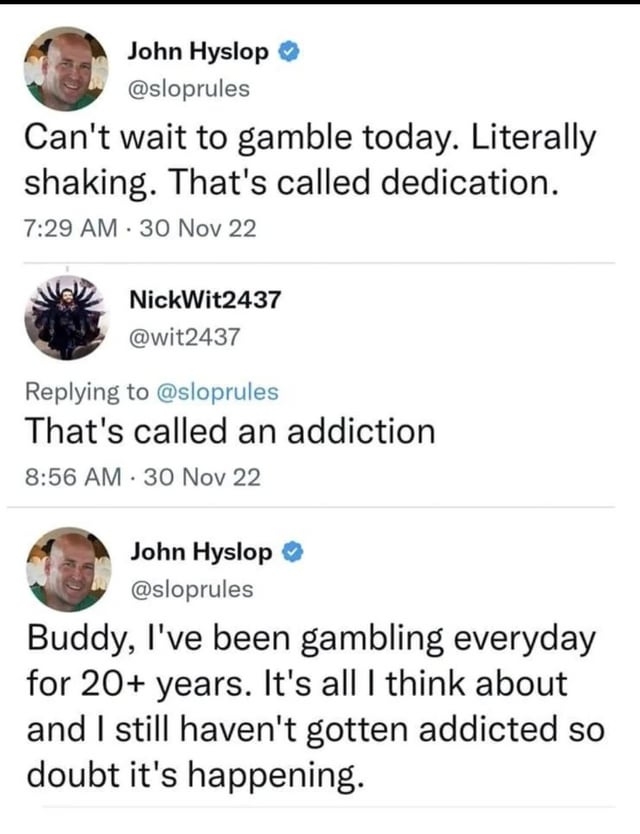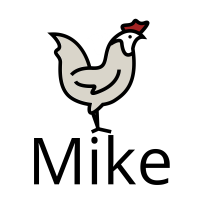seriously! like how do you become addicted to coffee, I drink it regularly but I can’t say I am caffeine addict or something. how one become a caffeine addict?
People conflate “Addicted” and “Dependant”. I’m not addicted to caffeine, but I will feel off by late morning if I haven’t had some.
This sounds like something an addict would say to cope with the fact that they have a dependency-based addiction to something.
https://www.medicalnewstoday.com/articles/addiction-vs-dependence
The terms “addiction” and “dependence” can seem similar, but they are different. Dependence occurs when the body physically relies on a drug. Addiction involves changes in behavior.
I have relatives who would get headaches if they didn’t get it. People’s bodies respond differently.
Get out while you still can. It’s too late for me.
Quit for one day, and enjoy that headache… you will be back my little addict.
Drink 5 cups of coffee every day for 6 months. Then quit all at once. That misery you’re experiencing? That’s called withdrawal. If you simply decrease your intake to 2 cups a day, you’ll feel less awake and alert. That’s how you know dependency has set in. If you can’t take those symptoms and go back to 5 cups a day, congrats you’re addicted just like normal people.
Also your English sucks, but that’s unrelated.
For some people, there is no addiction. I would swap between coffee and tea for my morning drink, but it was never an energy boost, just a warm drink for the winter months. Aside from that caffeine has no effect. I stopped drinking both cold turkey in an attempt to cut back on my sugar consumption and had no withdrawals.
It’s definitely got a genetic factor, but tea and a 12 oz cup of coffee aren’t excessive amounts of caffeine. The side-effects should be (hopefully) mild and mostly unnoticeable, except perhaps a day or two after quitting
might be worth it to consider that addiction is only a colloquial word for substance use disorders, which have strict diagnostic criteria
Takes a few months. Most notable symptom of withdrawal is usually headaches, lasts a day or two. It’s not a severe addiction, it’s a fairly mild one as they go.
I got jacked up within 2-weeks of hitting energy drinks and espresso. The headaches were blinding for a day or three. Guess I was really hitting it hard.

Drink a few cups a day for a year and then cut back to no caffeine.
If you get a headache you were addicted.
That’s drug dependence.
When the best part of waking up is folger’s in your cup that’s addiction
🎵
Isn’t that the same thing?
No
Depends on context. If you’re discussing it in a medical context, the terms are separate. Dependence refers specifically to the severity of the effects of stopping the drug, both physical and psychological. Addiction is more about the behavior of a person when exposed to the substances and is not as strictly defined of a term in a medical sense. But generally, dependence is a component addiction. So not all dependence results from addiction, but most definitions of addiction include some kind of dependence.
So, not the same thing, but also, outside of medical context, most people don’t differentiate the terms and use the word addiction to refer to the dependence component of addiction.
Joke’s on you, I have headaches either way!
Caffeine is physically addictive but a coffee/tea habit isn’t unhealthy. So you get physically addicted by drinking it everyday (will get the headache if you don’t have it) but it’s unlikely to cause addiction in the sense of harming your ability to live your life, or having negative health effects.
Caffeine has a metabolic half life of 6-12 hours. This means that after a 24 hour period, there could be 1/4 of the original caffeine amount you drank in your system. If you drink the same amount of caffeine again at that point, now after a 24 hour period you ‘ll have up to 1/4 of that 1.25 amount in your system. If you consume caffeine daily, this can lead to an accumulation of caffeine that your body adjusts to always being there, becoming the new baseline normal. This would feel fine until you stop, at which point the caffeine your body expects to be there is gone, and it needs to take time readjusting to that absence. That leads to withdrawal symptoms.
This is the best explanation for caffeine withdrawals that I’ve read. Thanks for the enlightenment!
No clue. While I don’t drink coffee, I did drink caffeinated sodas for a large part of my life. One day I just decided to stop drinking soda. I felt no sort of addiction or withdrawal symptom.
You say you drink it regularly, have you ever tried to stop? If you suddenly experience headaches and shakes after, I’ve bad news for you.
The thing is, caffeine addiction is so heavily normalized and encouraged by our capitalist society that most people do not realize they’re addicted. They consume caffeinated products with enough regularity that they never crave it, and you’re only ever encouraged to stop if you develop a health issue.
I went from drinking 6-8 cups every day to zero when COVID popped off and suffered zero headaches. My body chemistry is weird.
How old are you? The side-effects or withdrawal symptoms didn’t really become noticeable for me until my mid-30s…I went from feeling fine whether I had caffeine or not, to getting a headache in the afternoon if I missed my morning coffee, to waking up with a headache already that wouldn’t go away until I upped my dose.








